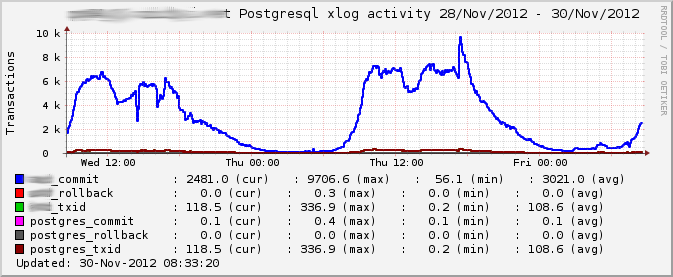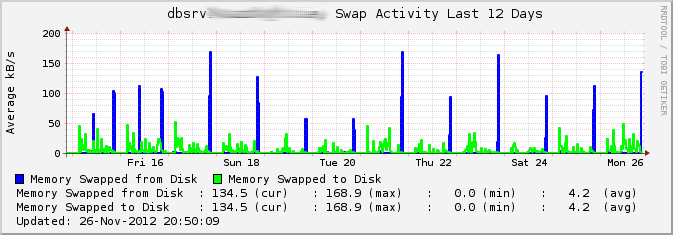
Using
zsh as default shell is perfect. Using
grml-zsh stuff to configure it, even better. Using
XTaran s config, way better. Using your own config, invaluable. Now, there is one thing that always bothered me: having all hosts I usually deal with in my
~/.ssh/config in order to have tab completion (and short names). I wanted to improve the situation and was kindly pointed in a different direction by
Myon, namely to just use the
~/.ssh/known_hosts for tab completion. How about that?
I started playing around with the config and, as it turns out, Axel already has something ready. Unfortunately, it didn t fulfill all my needs yet. That is because I have multiple
known_hosts files. Martin already filed a
bug to have ssh read
~/.ssh/known_hosts.d/* but that isn t resolved yet either, even though
upstream is aware of it. I thus had to point tab completion and ssh to multiple files by hand. But that s not too bad for now. Let s have a look:
Host *
HashKnownHosts no
Host *.your-work.com
User that-is-what-they-call-me-at-work
UserKnownHostsFile ~/.ssh/known_hosts.work
Host *.debian.org
UserKnownHostsFile ~/.ssh/known_hosts.debian
What am I doing? Well, we need to deactivate the hashing of known hosts. Otherwise your known_hosts files aren t readable as needed. Then you define your
known_hosts files for the domains you care about. Pretty straight forward.
Now, how about tab completion in zsh? Well, easy part actually:
[ -f ~/.ssh/config ] && : $ (A)ssh_config_hosts:=$ $ $ $ (@M)$ (f)"$(<~/.ssh/config)" :#Host * #Host :#*\** :#*\?*
[ -f ~/.ssh/known_hosts ] && : $ (A)ssh_known_hosts:=$ $ $ (f)"$(<$HOME/.ssh/known_hosts)" %%\ * %%,*
[ -f ~/.ssh/known_hosts.work ] && : $ (A)ssh_known_hosts_work:=$ $ $ (f)"$(<$HOME/.ssh/known_hosts.work)" %%\ * %%,*
[ -f ~/.ssh/known_hosts.debian ] && : $ (A)ssh_known_hosts_debian:=$ $ $ (f)"$(<$HOME/.ssh/known_hosts.debian)" %%\ * %%,*
zstyle ':completion:*:hosts' hosts $ssh_config_hosts $ssh_known_hosts $ssh_known_hosts_work $ssh_known_hosts_debian
What's here? We read and parse your
~/.ssh/config for configured hosts, then we parse all your
known_hosts files which are for me:
~/.ssh/known_hosts,
~/.ssh/known_hosts.work, and
~/.ssh/known_hosts.debian. And lastly, all is added to zsh completion for hosts. That actually works. :)
Axel, that makes a diff for you looking like this:
diff --git a/zsh.d/70-completion b/zsh.d/70-completion
index e92e068..5abf5cc 100644
--- a/zsh.d/70-completion
+++ b/zsh.d/70-completion
@@ -8,6 +8,8 @@
[ -f ~/.ssh/config ] && : $ (A)ssh_config_hosts:=$ $ $ $ (@M)$ (f)"$(<~/.ssh/config)" :#Host * #Host :#*\** :#*\?*
[ -f ~/.ssh/known_hosts ] && : $ (A)ssh_known_hosts:=$ $ $ (f)"$(<$HOME/.ssh/known_hosts)" %%\ * %%,*
+[ -f ~/.ssh/known_hosts.work ] && : $ (A)ssh_known_hosts_work:=$ $ $ (f)"$(<$HOME/.ssh/known_hosts.work)" %%\ * %%,*
+[ -f ~/.ssh/known_hosts.debian ] && : $ (A)ssh_known_hosts_debian:=$ $ $ (f)"$(<$HOME/.ssh/known_hosts.debian)" %%\ * %%,*
-zstyle ':completion:*:*:*' hosts $ssh_config_hosts $ssh_known_hosts
+zstyle ':completion:*:hosts' hosts $ssh_config_hosts $ssh_known_hosts $ssh_known_hosts_work $ssh_known_hosts_debian
Care to merge?
Oh, and before I forget... Of course you don't need to check each and every host by yourself. Debian provides ssh keys for all hosts on master. Just do a
scp master.debian.org:/etc/ssh/ssh_known_hosts ~/.ssh/known_hosts.debian
and I'm sure, your security aware employer has such a file for you as well. Doesn't he? ;)
 We were lazy and wrote a simple PostgreSQL monitoring check in shell instead of
using some proper language. The code looked about this:
We were lazy and wrote a simple PostgreSQL monitoring check in shell instead of
using some proper language. The code looked about this:
 The culprit turned out to be the kernel scheduler, fairly distributing CPU time
among all running processes. There's one single pgbouncer process, but hundreds
of postgres processes.
A simple renice of the pgbouncer process did the trick and gave us another
extra 2k tps.
The culprit turned out to be the kernel scheduler, fairly distributing CPU time
among all running processes. There's one single pgbouncer process, but hundreds
of postgres processes.
A simple renice of the pgbouncer process did the trick and gave us another
extra 2k tps.
 It turned out the reason is there are two clusters running, and the second one
isn't used as heavily as the first one. Disk I/O activity of the first cluster
slowly evicts pages from the second shared buffers cache to swap, and then the
daily pg_dump run reads them back every evening.
I was not aware of an easy way to get numbers for "amount of SysV shared memory
swapped to disk", but some googling led to shmctl(2):
It turned out the reason is there are two clusters running, and the second one
isn't used as heavily as the first one. Disk I/O activity of the first cluster
slowly evicts pages from the second shared buffers cache to swap, and then the
daily pg_dump run reads them back every evening.
I was not aware of an easy way to get numbers for "amount of SysV shared memory
swapped to disk", but some googling led to shmctl(2):
 May 7th, 2012
May 7th, 2012
 Using
Using  I already got mails like What a pity that your nice
I already got mails like What a pity that your nice 
 29. April 2011
29. April 2011